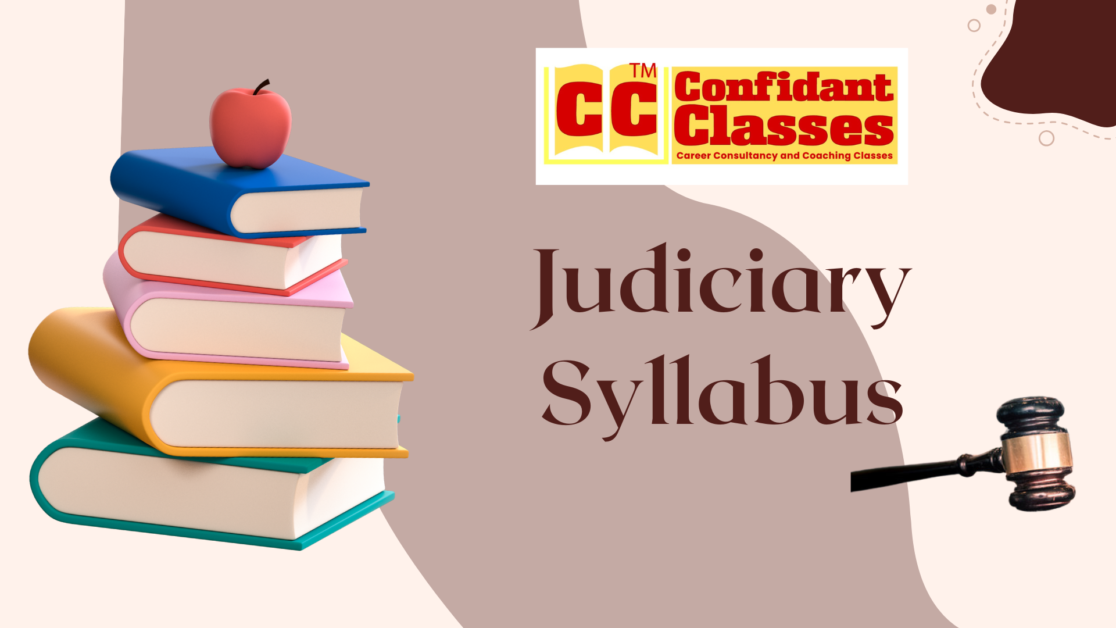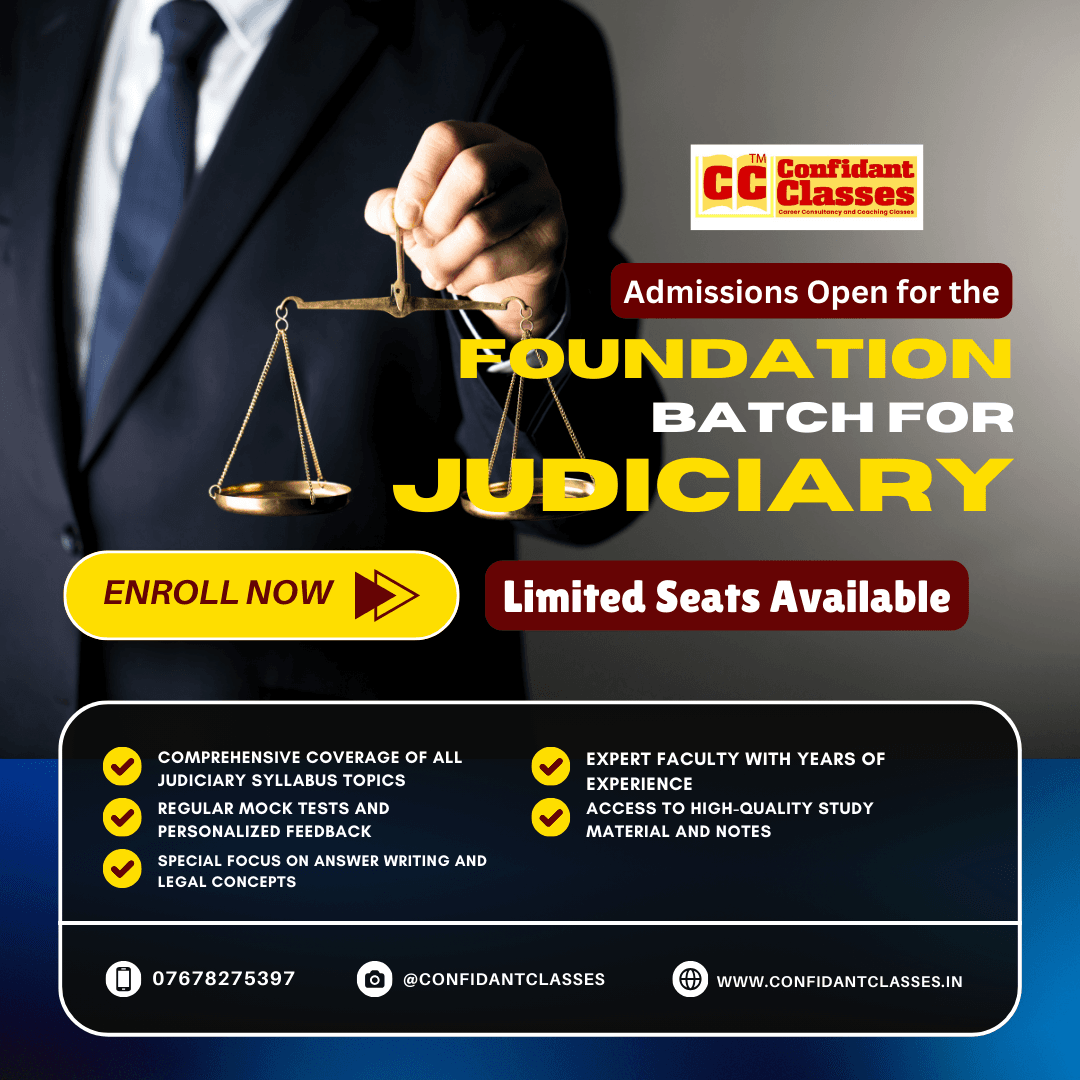Confidant Classes for Career Consultancy and Coaching Classes
Welcome to Confidant Classes: Your Path to a Successful Judiciary Career
Are you aspiring to become a judge or excel in judicial services?
At Confidant Classes, we understand the challenges of cracking judiciary exams and are here to empower your dreams. Our specialized coaching program for judiciary exams is meticulously designed to help you achieve success in your first attempt.
Why Choose Confidant Classes for Judiciary Coaching?
- Comprehensive Course Material
Our syllabus is aligned with the latest judiciary exam patterns and legal developments. From Constitutional Law to Civil and Criminal Procedure, we cover it all with in-depth explanations and practical examples.
- Expert Faculty
Learn from experienced legal professionals, former judges, and subject matter experts who bring years of teaching and practical knowledge to the classroom. Their guidance ensures you grasp even the most complex legal concepts with ease.
- Customized Study Plans
We understand that every student’s journey is unique. Our personalized study plans cater to your strengths and areas of improvement, ensuring efficient and targeted preparation.
- Mock Tests and Practice Sessions
Test your knowledge with regular mock exams and practice sessions that replicate actual exam scenarios. Our detailed feedback helps you identify areas to improve and builds your confidence.
- Interactive Learning Environment
Our classrooms and online platforms are designed to foster interactive learning. Engage in lively discussions, participate in moot courts, and enhance your understanding of legal procedures.
- Online and Offline Coaching
Whether you prefer in-person learning or the convenience of online classes, we have you covered. Our hybrid learning model ensures flexibility and accessibility for all students.
Proven Track Record of Success
Our students have consistently achieved top ranks in judiciary exams across the country. Join the ranks of successful judges who started their journey with Confidant Classes.
Judiciary Exam in India: Your Complete Guide
The Judiciary Exam in India is a gateway for aspiring legal professionals to join the esteemed judicial services. Conducted by various states, this competitive exam is designed to recruit civil judges and magistrates. If you’re passionate about upholding justice and contributing to society, this career path offers immense respect, stability, and responsibility.
What is the Judiciary Exam?
The Judiciary Exam, also known as the Judicial Services Examination, is a state-level examination conducted by High Courts or the Public Service Commissions of respective states. Successful candidates are appointed as judicial officers in the lower judiciary. The positions include Civil Judge (Junior Division) and Judicial Magistrate.
Key Highlights of the Judiciary Exam!
- Eligibility: Law graduates are eligible to apply.
- Exam Conducting Bodies: State Public Service Commissions or High Courts.
- Stages of Examination: Preliminary exam, Mains exam, and Interview.
- Age Limit: Typically ranges between 21 to 35 years (varies by state).
Why Choose Judiciary as a Career?
- Prestige and Respect: Judicial officers hold a highly respected position in society.
- Job Security: It is a government job offering stability and numerous benefits.
- Opportunities for Growth: The career offers avenues to rise to higher judicial positions.
- Social Impact: As a judge, you can directly contribute to delivering justice.
Eligibility Criteria
Educational Qualification:
- A degree in law (LLB) from a recognized university.
- Enrollment as an advocate under the Advocates Act, 1961, is mandatory in some states.
Age Limit:
- General category: 21-35 years
- Age relaxation is applicable for SC/ST, OBC, and other reserved categories as per state rules.
Judiciary Exam Pattern
The exam is conducted in three stages:
- Preliminary Examination:
- Objective-type questions.
- Focus on general knowledge, legal aptitude, and current affairs.
- Acts as a screening test for the Mains exam.
- Mains Examination:
- Descriptive/written exam.
- Subjects include Civil Law, Criminal Law, and Language Paper (varies by state).
- Evaluates the candidate’s legal knowledge and ability to express ideas clearly.
- Interview/Personality Test:
- Conducted to assess the candidate’s personality, communication skills, and suitability for judicial responsibilities.
Syllabus Overview
The syllabus for the Judiciary Exam may vary across states, but the core subjects include:
- Civil Law: Indian Contract Act, Transfer of Property Act, Specific Relief Act, etc.
- Criminal Law: Indian Penal Code (IPC), Code of Criminal Procedure (CrPC), Indian Evidence Act, etc.
- General Knowledge and Current Affairs: Includes static GK and recent events.
- Local Laws: Specific laws of the respective state conducting the exam.

Additional Stateswise Syllabus
Arunachal Pradesh, Assam, Jammu and Kashmir, Maharashtra, Manipur, and Nagaland:
Proficiency in the official language of Assam.
Bihar:
Elementary general Science, Administrative law, Hindu and Muslim personal laws, Principles of Equity, Law of trusts, Specific Relief Act, Commercial law.
Chhattisgarh: Accommodation Control Act, Court fees act, Registration Act and Chhattisgarh Land revenue code, Limitation, and Specific relief acts.
Delhi: Principles Governing Arbitration Law, the Partnership Act.
Goa: Sales of Goods Act, Land laws of Goa, The Scheduled Tribe and Scheduled Caste (Prevention of Atrocities Act, 1989).
Karnataka: Karnataka Rent Act.
Kerala: Kerala Building (Lease and Rent Control) Act.
Madhya Pradesh: Madhya Pradesh Accommodation Control Act, Madhya Pradesh Land Revenue Code.
How to Prepare for the Judiciary Exam?
- Understand the Syllabus: Familiarize yourself with the complete syllabus and focus on important topics.
- Create a Study Plan: Allocate time for each subject, focusing on your strengths and weaknesses.
- Practice Previous Year Papers: Analyze past papers to understand the pattern and type of questions asked.
- Read Bare Acts: Thoroughly read and understand the bare acts of relevant laws.
- Join Coaching or Online Courses: Enroll in a reputed judiciary coaching institute or opt for online courses for expert guidance.
- Stay Updated: Regularly read newspapers and legal journals to stay informed about current affairs and legal developments.
Tips to Ace the Judiciary Exam
- Consistency is Key: Dedicate a fixed number of hours daily to your studies.
- Time Management: Practice answering questions within a set time frame.
- Revise Regularly: Revisit important topics to ensure retention.
- Mock Tests: Take mock tests to improve speed and accuracy.
Top States Conducting Judiciary Exams
- Uttar Pradesh
- Rajasthan
- Madhya Pradesh
- Bihar
- Delhi
- Haryana
- Maharashtra
Each state has its unique exam pattern and syllabus, so it’s crucial to check the specific details for the state you’re applying to.
Study Materials
Booklets Of Substantive Laws + Procedural Laws Except Crpc, Cpc, Local Laws, Gs, Essay,
Translation, English
Handouts Of Lastest Supreme Court Judgments With Analysis By Respective Faculties Exhaustive Classroom Dictation
Faculties

1. RAJESH RANJAN: IPC, CRPC, CPC, Contract Act, Evidence Act, Constitutional Law, Negotiable Instruments Act, International Law, Transfer Of Property Act, Hindu Law, Muslim Law, Partnership Act, Judgment Writing
2. NAINA SEHGAL: Specific Relief Act, Rent Control Act, Limitation Act, Indian Easement Act, Trust Act, Sale Of Goods Act, Law Of Torts
3. RAJESH RANJAN, SUNIL SINGH: Essay
4. AKHILESH MISHRA: Translation
5. RAJESH RANJAN: English
6. GS & CURRENT AFFAIRS: When notification comes specialist teachers of respective states are invited to conduct classes.
7. LOCAL LAWS: When notification comes specialist teachers of respective states are invited to conduct classes.
What We Offer!
Judiciary & Other Law Exam Preparation
- Prelims, Mains, and Interview Guidance
- Subject-wise lectures and topic-wise tests
- Special focus on landmark judgments and current legal affairs
Skill Development Workshops
- Legal Writing and Drafting Skills
- Public Speaking and Courtroom Etiquette
- Analytical and Logical Reasoning Techniques
Support Beyond the Classroom
- One-on-one mentoring sessions
- Access to our vast library of legal resources
- Career counseling and placement support

Foundation Batch for Judiciary
Ace Your Judicial Career with Our Foundation Batch for Judiciary Coaching Are you dreaming of a successful career in the judiciary? Lay a solid foundation with our meticulously designed Foundation Batch for Judiciary Coaching Classes. Tailored for aspiring judicial officers, our program ensures comprehensive preparation, helping you build the knowledge, skills, and confidence required to excel in judicial services exams.

Targeted Batch for PCS (J) & APO Exams
Achieve Success with Our Targeted Batch for PCS(J) & APO ExamsAre you preparing for the PCS(J) and APO exams? Our Targeted Batch is specifically designed to help you focus on what matters most and maximize your chances of success. With an emphasis on strategic preparation and in-depth coverage of exam-relevant topics, we ensure you’re fully equipped to excel.

Online-Distance Coaching Classes for Judiciary & other Law Exams
Achieve Your Dream of Becoming a Judge or Lawyer—From Anywhere! Are you preparing for judiciary or law entrance exams but struggling to find the right guidance? We’ve got you covered! Our Online Distance Coaching Classes are designed to help aspiring legal professionals like you crack competitive exams with ease—all from the comfort of your home.

Subject-Specific Coaching Classes for Judiciary and Other Law Exams:
Unlock Your Legal Career with Expert Coaching! Are you preparing for Judiciary and other law competitive exams? Don’t let the vast syllabus overwhelm you! At Confidant Classes, we specialize in subject-specific coaching designed to make your journey smarter, smoother, and successful.

Weekend Batch for Judiciary and Other Law Exams:
Ace Your Judiciary and Law Exams with Our Weekend Batch! Are you a busy professional or a student juggling multiple commitments? Don’t let time constraints hold you back from achieving your dream of becoming a Judge or excelling in law exams!

Ace Your Judiciary and Law Exams with Our Expertly Crafted Mock Test Series!
What We Offer: ✔️ Subject-wise Mock Tests ✔️ Full-Length Judiciary Exam Simulations ✔️ State-Specific Judiciary Test Series (e.g., Rajasthan, Delhi, UP, etc.) ✔️ General Law Exams (CLAT PG, AILET PG, etc.) Benefits of Joining Our Mock Test Series: ✅ Boost your preparation with realistic practice. ✅ Identify and overcome weak areas. ✅ Stay confident and exam-ready!
Conclusion
The Judiciary Exam in India is a highly rewarding opportunity for those with a passion for law and justice. With the right preparation strategy, dedication, and guidance, you can achieve your dream of becoming a judicial officer. Start your journey today, and take the first step towards a fulfilling career in the judiciary.
For more information and resources, stay tuned to our website and get the latest updates on Judiciary Exams in India.
Video
Judicial Services FAQ's
The Judicial Examination or Provincial Civil Service Judicial Services Examination or PCS(J) are the examinations conducted for law graduates to be appointed as magistrates of the subordinate judiciary. These Magistrates are appointed by the state government under the supervision of the respective high court.
Judicial Service Examination is held in three successive stages namely Preliminary Examination, Mains and Viva-Voce/Interview.
Preliminary Examination– The preliminary examination serves as a screening for the mains exam. It comprises objective type questions. The marks secured in the preliminary examination are not counted for the final selection. The percentages of qualifying marks vary as per state. The minimum qualifying marks in the preliminary examination is 60 per cent for general and 55 per cent for reserved categories.
Mains Examination– The mains examination is a subjective type. The exam comprises three to four papers. The marks secured by candidates are counted for the final selection. Candidates equal to three times the number of vacancies are called for viva-voce.
Viva-Voce/Personal Interview– This is the final stage of selection where candidates are assessed on general interest, personality and intelligence among other factors.
Judicial Service Examination is held in three successive stages namely Preliminary Examination, Mains and Viva-Voce/Interview.
Preliminary Examination– The preliminary examination serves as a screening for the mains exam. It comprises objective type questions. The marks secured in the preliminary examination are not counted for the final selection. The percentages of qualifying marks vary as per state. The minimum qualifying marks in the preliminary examination is 60 per cent for general and 55 per cent for reserved categories.
Mains Examination– The mains examination is a subjective type. The exam comprises three to four papers. The marks secured by candidates are counted for the final selection. Candidates equal to three times the number of vacancies are called for viva-voce.
Viva-Voce/Personal Interview– This is the final stage of selection where candidates are assessed on general interest, personality and intelligence among other factors.
Judicial Service Examination is held in three successive stages namely Preliminary Examination, Mains and Viva-Voce/Interview.
Preliminary Examination– The preliminary examination serves as a screening for the mains exam. It comprises objective type questions. The marks secured in the preliminary examination are not counted for the final selection. The percentages of qualifying marks vary as per state. The minimum qualifying marks in the preliminary examination is 60 per cent for general and 55 per cent for reserved categories.
Mains Examination– The mains examination is a subjective type. The exam comprises three to four papers. The marks secured by candidates are counted for the final selection. Candidates equal to three times the number of vacancies are called for viva-voce.
Viva-Voce/Personal Interview– This is the final stage of selection where candidates are assessed on general interest, personality and intelligence among other factors.

